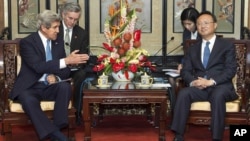BEIJING —
The United States and China have expressed their desire to work together to get North Korea to give up its nuclear ambitions. Just how the two will do that remains uncertain. North Korea topped the agenda during a visit by the top U.S. diplomat to Beijing on Saturday.
U.S. Secretary of State John Kerry says both Beijing and Washington support the goal of a denuclearized Korean peninsula.
"China and the United States today recommitted to find a peaceful solution and we say to Kim Jung Un and to the government of the DPRK, they have an obvious choice here - which is to join us to try and find a negotiated resolution. Regardless of what they do, we will continue to fight for that," he said.
Kerry has been urging Chinese officials to use their influence as the North’s biggest ally to get it to pull back from its provocations. China, however, made no indication on Saturday that it was going to step up the pressure on its neighbor.
In comments to reporters, State Councilor Yang Jiechi reiterated China’s long-held stance that talk, not tougher measures such as sanctions, are the solution.
"China will work with other relevant parties, including the United States, to play a constructive role in promoting the six-party talks," he said.
The talks, which include host China, the United States, Japan, Russia, South Korea and the North, have been stalled since 2008.
Kerry did not comment on just what China was prepared to do, but did say that in his consultations with Chinese officials, no option was left off the table, and they had a full discussion of what the possibilities might be.
Kerry says both Beijing and Washington are committed to taking actions to achieve the goal of a denuclearized Korean peninsula.
“We really want to focus people on the better alternative. We don't want to get into a threat for threat or some kind of confrontational language here. There's been enough of that," he said.
Kerry says U.S. General Martin Dempsey, the chairman of the Joint Chiefs of Staff, and representatives from U.S. intelligence agencies, travel to Beijing later this month to, as Kerry put it, make sure that this is not rhetoric, but real policy that is being implemented.
Secretary Kerry’s trip to Beijing is part of a four-day Asia tour that comes at a time when tension remains high over North Korean threats to carry out a nuclear attack.
North Korea was not the only item that Kerry discussed in his meetings that included visits with Chinese President Xi Jinping, Premier Li Keqiang, State Councilor Yang and Foreign Minister Wang Yi.
Kerry also discussed cyber attacks and climate change with his Chinese hosts. During the meetings, China and the United States agreed to set up working groups for both issues when the two countries hold their annual Strategic and Economic Dialogue Talks in Washington this July.
U.S. Secretary of State John Kerry says both Beijing and Washington support the goal of a denuclearized Korean peninsula.
"China and the United States today recommitted to find a peaceful solution and we say to Kim Jung Un and to the government of the DPRK, they have an obvious choice here - which is to join us to try and find a negotiated resolution. Regardless of what they do, we will continue to fight for that," he said.
Kerry has been urging Chinese officials to use their influence as the North’s biggest ally to get it to pull back from its provocations. China, however, made no indication on Saturday that it was going to step up the pressure on its neighbor.
In comments to reporters, State Councilor Yang Jiechi reiterated China’s long-held stance that talk, not tougher measures such as sanctions, are the solution.
"China will work with other relevant parties, including the United States, to play a constructive role in promoting the six-party talks," he said.
The talks, which include host China, the United States, Japan, Russia, South Korea and the North, have been stalled since 2008.
Kerry did not comment on just what China was prepared to do, but did say that in his consultations with Chinese officials, no option was left off the table, and they had a full discussion of what the possibilities might be.
Kerry says both Beijing and Washington are committed to taking actions to achieve the goal of a denuclearized Korean peninsula.
“We really want to focus people on the better alternative. We don't want to get into a threat for threat or some kind of confrontational language here. There's been enough of that," he said.
Kerry says U.S. General Martin Dempsey, the chairman of the Joint Chiefs of Staff, and representatives from U.S. intelligence agencies, travel to Beijing later this month to, as Kerry put it, make sure that this is not rhetoric, but real policy that is being implemented.
Secretary Kerry’s trip to Beijing is part of a four-day Asia tour that comes at a time when tension remains high over North Korean threats to carry out a nuclear attack.
North Korea was not the only item that Kerry discussed in his meetings that included visits with Chinese President Xi Jinping, Premier Li Keqiang, State Councilor Yang and Foreign Minister Wang Yi.
Kerry also discussed cyber attacks and climate change with his Chinese hosts. During the meetings, China and the United States agreed to set up working groups for both issues when the two countries hold their annual Strategic and Economic Dialogue Talks in Washington this July.




